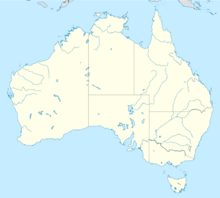Earth:Nammuldi mine
| Location | |
|---|---|
| Location | Pilbara |
| State | Western Australia |
| Country | Australia |
| Coordinates | [ ⚑ ] : 22°25′07″S 117°21′37″E / 22.418579°S 117.360397°E |
| Production | |
| Products | Iron ore |
| Production | 6.6 million tonnes/annum |
| History | |
| Opened | 2006 |
| Owner | |
| Company | Rio Tinto Iron Ore |
| Website | Rio Tinto Iron Ore website |
The Nammuldi mine is an iron ore mine located in the Pilbara region of Western Australia, 60 kilometres north-west of Tom Price.[1]
The mine is fully owned and operated by Rio Tinto Iron Ore and is one of twelve iron ore mines the company operates in the Pilbara.[2][3] In the calendar year 2009, the combined Pilbara operations produced 202 million tonnes of iron ore, a 15 percent increase from 2008.[4] The Pilbara operations accounted for almost 13 percent of the world's 2009 iron ore production of 1.59 billion tonnes.[5][6]
The Hamersley Range, where the mine is located, contains 80 percent of all identified iron ore reserves in Australia and is one of the world's major iron ore provinces.[7]
Overview
Rio Tinto's iron ore operations in the Pilbara began in 1966.[2] The mine itself began operations in 2006, during a time when Rio Tinto increased the production output of its mines in the Pilbara due to increased demands.[8] The mine has an annual production capacity of 6.6 million tonnes of iron ore, sourced from open-pit operations. The ore is processed on site before being loaded onto rail.[9]
Ore from the mine is then transported to the coast through the Hamersley & Robe River railway, where it is loaded onto ships.[10]
The mine's workforce is on a fly-in fly-out roster.[9]
The mine is located near the Brockman mine, also operated by Rio Tinto.[2] Rio Tinto briefly had to close the mine in February 2009, alongside Brockman, because of heavy rain and floods in the region.[11]
From October 2015 all of the ore trucks on the site, and those at Yandicoogina mine are remotely controlled from Perth, 1,200 kilometres (750 mi) away. These are the world's first two mines that have moved all their iron ore "using fully remote-controlled trucks".[12]
The mine is owned by Hamersley Iron Pty Ltd, a fully owned subsidiary of Rio Tinto, which owns six mines in the Pilbara, including Nammuldi, and partly owns two more mines in the region.[13]
References
- ↑ MINEDEX website: Nammuldi search result accessed: 6 November 2010
- ↑ 2.0 2.1 2.2 Pilbara Rio Tinto Iron Ore website, accessed: 6 November 2010
- ↑ Mining Rio Tinto Iron Ore website, accessed: 6 November 2010
- ↑ Preparing for the future Rio Tinto presentation, published: 23 March 2010, accessed: 7 November 2010
- ↑ Global iron-ore production falls 6,2% in 2009 – Unctad report miningweekly.com, published: 30 July 2010, accessed: 7 November 2010
- ↑ Production of iron ore fell in 2009, but shipments continued to increase, report says[yes|permanent dead link|dead link}}] UNCTAD website, published: 30 July 2010, accessed: 7 November 2010
- ↑ Iron fact sheet – Australian Resources and Deposits Geoscience Australia website, accessed: 7 November 2010
- ↑ Iron ore mining outlook miningaustralia.com.au, published: 12 November 2007, accessed: 7 November 2010
- ↑ 9.0 9.1 Nammuldi mine Rio Tinto Iron Ore website, accessed: 6 November 2010
- ↑ Rail Rio Tinto Iron Ore website, accessed: 6 November 2010
- ↑ Rio Tinto resuming Australian iron-ore mining after floods mining-journal.com, published: 25 February 2009, accessed: 7 November 2010
- ↑ Diss, Kathryn (18 October 2015). "Driverless trucks move all iron ore at Rio Tinto's Pilbara mines, in world first". ABC News (Australian Broadcasting Corporation). http://www.abc.net.au/news/2015-10-18/rio-tinto-opens-worlds-first-automated-mine/6863814. Retrieved 18 October 2015. "The first two mines in the world to start moving all of their iron ore using fully remote-controlled trucks have just gone online in Western Australia's Pilbara."
- ↑ Western Australian Mineral and Petroleum Statistic Digest 2009 Department of Mines and Petroleum website, accessed: 8 November 2010
External links
- Rio Tinto Iron Ore website
- MINEDEX website Database of the Department of Mines and Petroleum



